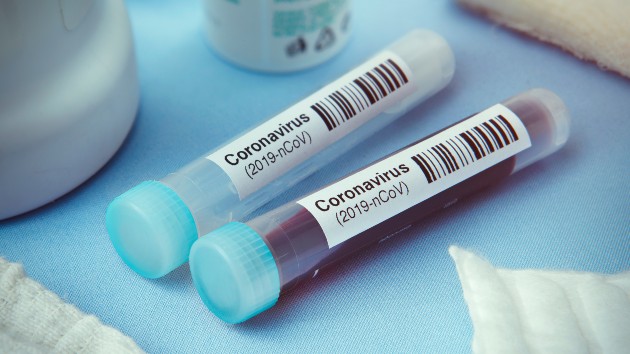 narvikk/iStockBy MORGAN WINSOR, ERIN SCHUMAKER and IVAN PEREIRA, ABC News
narvikk/iStockBy MORGAN WINSOR, ERIN SCHUMAKER and IVAN PEREIRA, ABC News
(NEW YORK) — A pandemic of the novel coronavirus has now infected more than 99.7 million people worldwide and killed over 2.1 million of them, according to real-time data compiled by the Center for Systems Science and Engineering at Johns Hopkins University.
Here’s how the news is developing Tuesday. All times Eastern:
Jan 26, 9:43 am
Europe’s longest land border closes over new variant
Europe’s longest land border, spanning more than 1,000 miles, has closed for the first time since World War II.
Sweden’s temporary ban on entry from neighboring Norway went into effect Monday and will last until at least Feb. 14. The Swedish government has also extended an entry ban from the United Kingdom and Denmark until the same date.
The move comes amid concerns over a new, more contagious variant of the novel coronavirus that was first identified in the U.K. and has since spread to Norway’s capital and the surrounding area.
On Saturday, shortly before Sweden announced the new travel ban, the Norwegian government imposed strict new lockdown measures for Oslo and nine neighboring municipalities due to an outbreak of the variant.
Jan 26, 9:07 am
South Africa tells rich countries to stop hoarding COVID-19 vaccines
South African President Cyril Ramaphosa has accused wealthy countries of hoarding excess doses of COVID-19 vaccines that they had ordered but did not immediately need.
He said rich countries had “acquired large doses of vaccines” — some “up to four times what their population needs” — “to the exclusion of other countries.”
“We need those who have hoarded the vaccines to release the vaccines so that other countries can have them,” Ramaphosa told a virtual meeting of the World Economic Forum on Tuesday. “We are all not safe if some countries are vaccinating their people and other countries are not.”
Ramaphosa’s comments come as African nations grapple with a rising number of COVID-19 infections. South Africa accounts for nearly half of the continent’s confirmed cases and deaths from the disease, according to the latest data from the Africa Centers for Disease Control and Prevention.
Ramaphosa chairs the African Union, which secured a provisional 270 million COVID-19 vaccine doses from manufacturers last week for its 55 member states across the continent. Ramaphosa said those doses will supplement the 600 million to be acquired from the COVAX Facility, a global initiative co-led by the World Health Organization to ensure rapid and equitable access to COVID-19 vaccines for all countries regardless of income.
Jan 26, 8:31 am
Biden is a ‘game-changer’ for COVID-19 response, New Jersey governor says
Having Joe Biden in the Oval Office versus Donald Trump is a “complete game-changer” for the country’s COVID-19 response, New Jersey Gov. Phil Murphy said.
“Two ways: obsession with this, knowing that public health creates economic health, and a consistent national strategy as opposed to a patchwork quilt. It’s a complete game-changer over the past six days,” Murphy, a Democrat, told ABC News chief anchor George Stephanopoulos in an interview Tuesday on Good Morning America.
Murphy said his state, like many others, desperately needs more doses of COVID-19 vaccines.
“We need more doses,” he said. “The Biden administration knows that, they’ve entered into what I think is an empty cupboard and they’re frantically, I know, obsessed with building that supply back.”
New Jersey has confirmed more than 666,000 cases of COVID-19 since the start of the pandemic, including at least 20,972 deaths. The Garden State has administered 551,209 doses of COVID-19 vaccines as of Tuesday morning, according to real-time data collected by Johns Hopkins University.
The Centers for Disease Control and Prevention has delivered almost double the amount of vaccine doses to New Jersey than have been administered there. Murphy said part of the issue is that a federally-run long-term care channel is putting aside doses in advance of visits to nursing homes and other care facilities.
“So it looks like they’re not getting used. Those are actually earmarked for distribution over the next week or two,” he said. “And then on the state side, … we’re not throwing any doses away, I promise you that. … We are putting as many shots in the arms as possible.”
In order for New Jersey to meet the goal of vaccinating 70% of its population within six months, Murphy said the state needs two or three times the weekly dosage of COVID-19 vaccines that they’re currently getting.
“I’m confident we’ll get there,” he said. “It’s not going to be as early as we had hoped, but I’m confident we’re going to get there and I think by the time we turn to the summer, we’re in a whole different place.”
Biden aims to reopen all elementary schools and bring students for in-person learning within the first 100 days of his presidency, but Murphy said New Jersey will likely have to do a mix of remote and in-person learning.
“I’m not sure we can do it all in, fully in-person,” he said. “I think the game-changer will be whether or not we can get the vaccinations for our educators.”
Jan 26, 4:32 am
US reports over 147,000 new cases
There were 147,254 new cases of COVID-19 confirmed in the United States on Monday, according to a real-time count kept by Johns Hopkins University.
Monday’s case count is far less than the country’s all-time high of 298,031 newly confirmed infections on Jan. 2, Johns Hopkins data shows.
An additional 1,758 fatalities from COVID-19 were registered nationwide on Monday, down from a peak of 4,462 new deaths on Jan. 12, according to Johns Hopkins data.
COVID-19 data may be skewed due to possible lags in reporting over the Martin Luther King Jr. Day holiday weekend.
A total of 25,297,072 people in the U.S. have been diagnosed with COVID-19 since the pandemic began, and at least 421,129 have died, according to Johns Hopkins data. The cases include people from all 50 U.S. states, Washington, D.C., and other U.S. territories as well as repatriated citizens.
Much of the country was under lockdown by the end of March as the first wave of the pandemic hit. By May 20, all U.S. states had begun lifting stay-at-home orders and other restrictions put in place to curb the spread of the novel coronavirus. The day-to-day increase in the country’s cases then hovered around 20,000 for a couple of weeks before shooting back up over the summer.
The numbers lingered around 40,000 to 50,000 from mid-August through early October before surging again to record levels, crossing 100,000 for the first time on Nov. 4, then reaching 200,000 on Nov. 27 before nearing 300,000 on Jan. 2.
So far, the U.S. Food and Drug Administration has authorized two COVID-19 vaccines for emergency use — one developed by U.S. pharmaceutical giant Pfizer and its German partner BioNTech, and another developed by American biotechnology company Moderna and the National Institute of Allergy and Infectious Diseases.
Copyright © 2021, ABC Audio. All rights reserved.



Comments are closed.